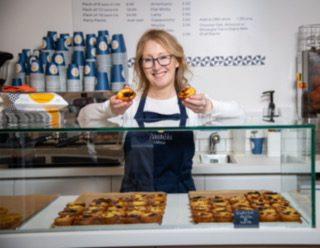Pasteis Lisboa
As part of the launch of our Guide to Business Resilience, we reached out to a number of smaller business owers to find out what business resilience meant to them.
In this interview, we speak to Emma Airley, Founder of Pasteis Lisboa, about what business resilience means in her industry.
What does business resilience mean to you?
Two things: in the literal sense, having mitigation plans in place in case of internal or external risk factors - economic, logistical, staffing, financial cushions, etc, and in the more abstract sense, our resilience as business owners to ride out the inevitable knocks that do come, and having these make us stronger and more knowledgeable rather than beat us!
What kinds of changes have you made to reduce overheads in the current climate?
Our business only launched ten months ago, and we did foresee and account for many of the current issues affecting businesses when still in the planning and forecasting process - VAT increase, rising ingredient costs, energy crisis - so we did account and budget for these ahead of opening.
Consequently, the impact on our business has been significantly lower than for others in our sector (hospitality/food & drink).
We will not compromise on the quality of our product and the ingredients used, or on our commitment to staff salaries (above Living Wage) & employment terms.
Instead, we constantly examine efficiency of processes, wastage, etc. and have brought our staff onboard to work with us on that.
Savings benefit them too, so they're engaged in the need for them as are we.
How has the energy crisis impacted your business?
Directly - not hugely, thanks to what's noted above about us anticipating the energy crisis.
Indirectly - the impact on suppliers, etc, of course impacts on us when they increase costs to mitigate their own problems with the energy crisis.
So no matter how well prepared we've been, we're still affected.
What is your approach to debt and finance?
We don't like debt, firstly, and we were fortunate in that our financing was a third from our own savings/assets, another third was from a private investor with whom we have a very equitable shareholding agreement, and the remainder was from the British Business Bank's Start-Up Loans Program.
The Briitsh Business Bank is a terrific partner.
We always pay invoices extremely promptly, so we always know where we are financially and don't let debts build up on accounts, and we're mindful of the impact of poor cashflow on our suppliers, many of whom are small businesses like us.
We are a 99% retail to direct customers business too, so we don't rely on creditors in the way many other businesses do - payment is made at time of purchase - which helps.
If the question is regarding our approach to finance options for businesses - as we continue to grow Pasteis Lisboa, we'll be continuing to avoid high street/traditional lending sources and will without doubt approach the British Business Bank for, at the very least, advice before raising additional finance to expand, if not funding itself, and use the connections and contacts which we've been lucky enough to build during our period as Ambassadors for Start Up Loans.
How do you nurture your customer relationships?
A consistently exceptional product offering, which we never compromise on, and incredible customer service.
It's not rocket science. Get those right and never, ever compromise on them.
It's worked in all of my family's businesses over the decades, in my own previous businesses, and it will continue to work at Pasteis Lisboa.
It takes hard, hard work and attention to detail, but we have an amazing team who are invested and proud of what they produce and achieve too.
What measures have you taken to attract and retain talent in a tough climate?
No matter how incredible your product or service is, if you don't have your staff on board with you, with the same vision and standards, you're in trouble.
This business is our baby, not theirs - ultimately staff will never be as invested emotionally as us - but our business success absolutely depends on them.
So, because it's (firstly) morally right, and right for the business, we:
- Always pay at or above (in the majority of cases) the Scottish Living Wage level;
- Never, ever use zero-hours contracts - all staff are on permanent contracts;
- Have company pension scheme, provide all uniforms, give generous holiday allowances, are flexible with time off and holidays, provide full pay for all sick leave, give generous staff discounts;
- All breaks are paid - unusual in our sector;
- We regularly treat staff - treats at work, paid for nights/meals out, little competitions & games among staff which we provide prizes for, ad-hoc bonuses for excellent work, problem solving, team-working, etc;
- Never, ever ask staff do anything we wouldn't do ourselves, and we demonstrate that through our actions too - even the filthiest jobs we will do ourselves first, and our staff know it;
- Pay for and facilitate regular training/upskilling.
- Offer particularly sociable shift patterns and hours c/w other businesses in our sector.
How important is innovation and technology in future proofing your business and give an example of where you've invested in it?
We're always reviewing where we can use technology to streamline or make our business more efficient; most relevant at present is developing an ecommerce website so we can offer our specialist deli products online, looking at digital loyalty programmes, etc, for customers.
But otherwise, there's not really much else applicable to our business model on the tech side so far.
Emma Airley Co Founder Pastéis Lisboa
Emma Airley, co-founder at Pastéis Lisboa, is the 3rd generation of a family which has been in the hospitality industry since the 1950s.
She and her partner, Sebastian Bacewicz, were inspired by the new-wave of modern pastelarias in Portugal which specialise only in the iconic Pastel de Nata.
Together they channelled their passion for food and hospitality into developing and launching Pastéis Lisboa – the very first specialist Pastel de Nata bakery in Scotland – with a bang in Glasgow’s buzzing West End in August 2022.

Disclaimer: We make reasonable efforts to keep the content of this article up to date, but we do not guarantee or warrant (implied or otherwise) that it is current, accurate or complete. This article is intended for general information purposes only and does not constitute advice of any kind, including legal, financial, tax, or other professional advice. You should always seek professional or specialist advice or support before doing anything on the basis of the content of this article.
Neither British Business Bank plc nor any of its subsidiaries are liable for any loss or damage (foreseeable or not) that may come from relying on this article, whether as result of our negligence, breach of contract or otherwise. “Loss” includes (but is not limited to) any direct, indirect, or consequential loss, loss of income, revenue, benefits, profits, opportunity, anticipated savings, or data. We do not exclude liability for any liability which cannot be excluded or limited under English law.
Tags related to content:

Focusing on customers
When times are tough it always pays to focus on your customers.
Shrinking disposable incomes mean making sure your customer service is at its best is vital.
But, knowing the right place to turn to for guidance can be a challenge.
With tips on everything from attracting customers to increasing customer spending, our Guide to Building Business Resilience could help your business prepare for the future.



